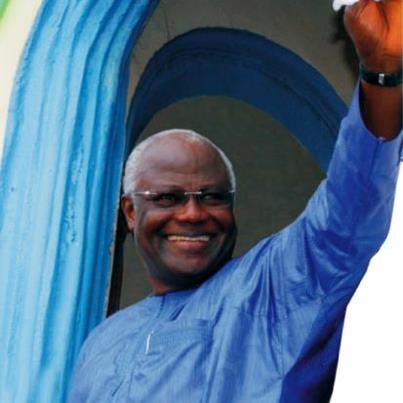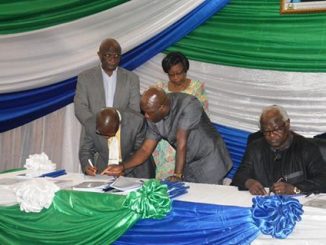
 Executive Directors of the African Development Bank (AfDB) Group (http://www.afdb.org) on Wednesday, 18 September 2013 in Tunis approved Sierra Leone’s Country Strategy Paper (CSP) 2013-2017, which outlines the Bank Group’s programmatic support to enable Sierra Leone to transition out of fragility while ensuring the country’s overall development sustainability.
Executive Directors of the African Development Bank (AfDB) Group (http://www.afdb.org) on Wednesday, 18 September 2013 in Tunis approved Sierra Leone’s Country Strategy Paper (CSP) 2013-2017, which outlines the Bank Group’s programmatic support to enable Sierra Leone to transition out of fragility while ensuring the country’s overall development sustainability.
Logo AfDB: http://www.photos.apo-opa.com/plog-content/images/apo/logos/african-development-bank-2.png
Based on a participatory approach and guided selectivity, the Sierra Leone CSP is aligned with Government’s Agenda for Prosperity (A4P), as well as Bank Group’s key policies including the evolving New Deal for Engagement in Fragile States for which Sierra Leone is a pilot country.
It emphasizes the Bank’s mandate and comparative advantage in ensuring recovery of Africa’s fragile states by leveraging potential resources, regional operations, co-financing and public private partnerships.
In his presentation to the Board, Mr. Franck Perrault, Regional and Country Operations Director for West Africa 2 (ORWB), underlined that Sierra Leone has made continuous progress in consolidating country-wide peace and security while rebuilding its economy that was nearly destroyed by the decade-long conflict which ended in 2002. He explained that the strategy was built on the rationale that the underlying drivers of the country’s fragility continue to pose significant downside risks for the country’s development.
Among the drivers of fragility are high rates of youth unemployment estimated at 70%, gender inequality, high levels of perceived and real corruption, weak human and institutional capacities and poor economic governance systems, especially public financial management (PFM) and revenue management systems, which constrain the Government’s capacity to implement its development agenda.
Among other imperatives factored into the CSP, improving the provision of physical infrastructure, especially in energy, water supply and roads, is key to sustained inclusive growth and to the country’s ability to implement its transformation agenda.
Consequently, the strategy focuses on the following two pillars that are designed to support Sierra Leone’s transformation and transitioning towards a more resilient development path. The first pillar, Enhancing Economic Governance and Transparent Management of Natural Resources Revenue, will build on existing public financial management (PFM) reforms and promote the transparent management of natural resource revenues. The second pillar, Supporting Transformational and Sustainable Infrastructure Development in energy, roads and water, will facilitate inclusive green growth, foster regional integration and enhance private sector development and competitiveness.
Support to the above-mentioned critical areas also seeks to diversify the economy into areas that are employment driven and inclusive in nature across demographic, gender and geographic groupings. The regional dimension of fragility is also considered in the formulation of the strategy as this would provide additional opportunities to the country in terms of trade and diversification.
Mr. Yero Balde , the AfDB Resident Representative in Sierra Leone responded to board questions on the sustainability of the Bank’s efforts in Sierra Leone and the role of SLFO in policy dialogue and advisory support, portfolio management and resource mobilization, critical for the successful implementation of this strategy. At the end of May 2013, the Bank Group’s active portfolio for Sierra Leone comprised of ten on-going operations at different stages of implementation, with a total commitment of UA 116.1 million. These operations span different sectors.
Infrastructure, private and Governance sectors are among the Bank’s priority sectors and constitute 88.5% of the Bank’s total commitments. The other sectors include agriculture, social and financial sectors. The Bank’s portfolio also includes two multinational operations – the West Africa Monetary Zone Payments System Project and the Capacity Building and Technical Assistance to the Mano River Union Secretariat. The average portfolio age is 2.2 years, including a project which is closing at the end of 2013.
Distributed by the African Press Organization on behalf of the African Development Bank (AfDB).
About the African Development Bank Group
The African Development Bank Group (AfDB) (http://www.afdb.org) is Africa’s premier development finance institution. It comprises three distinct entities: the African Development Bank (AfDB), the African Development Fund (ADF) and the Nigeria Trust Fund (NTF). On the ground in 34 African countries with an external office in Japan, the AfDB contributes to the economic development and the social progress of its 53 regional member states.
For more information: j.mp/AFDB_Media
SOURCE
African Development Bank (AfDB)




Leave a Reply